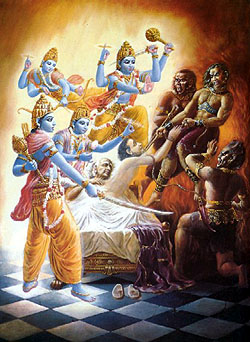
Separating the Men From the Animals
Sukadeva Gosvami said to King Pariksit: In the city known as Kanyakubja [Kanauj in present-day India] there lived a brahmana named Ajamila who married a prostitute maidservant and lost all his brahminical qualities because of the association of that low-class woman. Ajamila gave trouble to others by arresting them, by cheating them in gambling, or by directly plundering them. This was the way he earned his livelihood and maintained his wife and children. (Srimad-Bhagavatam 6.1.21–22)
The Law of Consequences
Although Ajamila was born of a brahmana father and strictly followed the regulative principles—no meat-eating, no illicit sex, no intoxication, and no gambling—he fell in love with a prostitute, and therefore all his good qualities were lost. As soon as a person abandons the regulative principles, he engages in various kinds of sinful activities. The regulative principles serve to keep us on the standard of human life. But if we abandon them, we fall down into illusory life, or maya.
If we want to advance in spiritual life, we must follow the regulative principles and rectify the mistakes of our past lives and this present life. Only those who have become free from all kinds of sinful reactions and are now engaged in pious activities can fully understand God. Persons who commit sinful activities and who are overly attached to bodily comforts and mundane friendship, society, and family affection cannot be spiritually self-realized.
The fault of illicit connection with women is that it destroys all one’s brahminical qualities. Ajamila abandoned all the regulative principles due to his association with a prostitute. He became a cheater and a thief. One who acts dishonestly will be punished. He may escape the king’s or government’s law, but he can never escape God’s law. The materialists think, “I am cheating God, and I can continue to gratify my senses by all nefarious activities.” But the sastras (scriptures) state that such persons are cheating their own happiness in the end, because they will have to accept a material body again and suffer accordingly.
A man who is born in a brahmana family is expected to be truthful and self-controlled, to be fully cognizant of spiritual life and its practical application, and to have complete faith in the statements of the sastras.
If a person does not follow the sastras, he becomes degraded. The great sages and rsis throughout the world have given guidance, and their words are recorded in the sastras. But rascals and fools misinterpret the scriptures and misguide the people. At present, the Bhagavad-gita is interpreted in so many different ways, and these so-called explanations are accepted by the innocent public as authoritative knowledge. One interpreter explains that the battlefield of Kuruksetra refers to the material body and that the five Pandava brothers are really the five senses of the material body. But this is not the proper understanding. How can anyone explain the Bhagavad-gita when he does not understand it? Such an attempt is nonsense.
To understand the bona fide science of God, one must approach a bona fide spiritual master and hear the Bhagavad-gita from him. We have to follow the great personalities, the previous acaryas (spiritual masters). That will be to our profit. We should not speculate and make up our own statements. We should simply accept the injunctions given by the great acaryas, because that is the process of the Vedic system. One must approach a bona fide spiritual master and inquire from him submissively. The Absolute Truth is explained in the scriptures, and the scriptures are explained by the spiritual master or a saintly person. Whatever the bona fide, self-realized spiritual master says must be accepted.
There is no room for interpretation of the sastras. In the Srimad-Bhagavatam it is said that Krsna lifted Govardhana Hill just as a child lifts a mushroom. He did it so easily, but people do not believe it. Those who do not believe in the Bhagavatam interpret an indirect meaning. The meaning is clear, and there is nothing to be misunderstood, but these rascals draw their own conclusions nonetheless.
When the language is clear, why should we interpret? By interpretation, so-called scholars and theologians have played havoc with the Vedic literature. No bona fide acarya has ever interpreted the sastras according to his own whims, but many so-called modern scholars and leaders have done so, and therefore people are gliding down into the most abominable conditions of material existence. In the interest of the people, these rascals should be exposed. Therefore we are presenting the Bhagavad-gita As It Is.
No comments:
Post a Comment